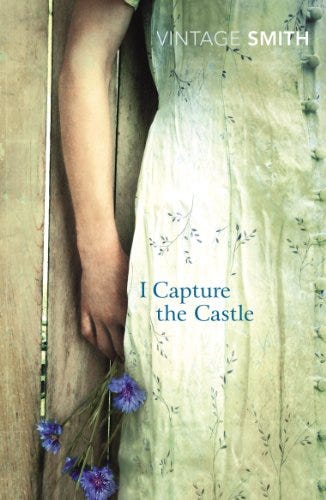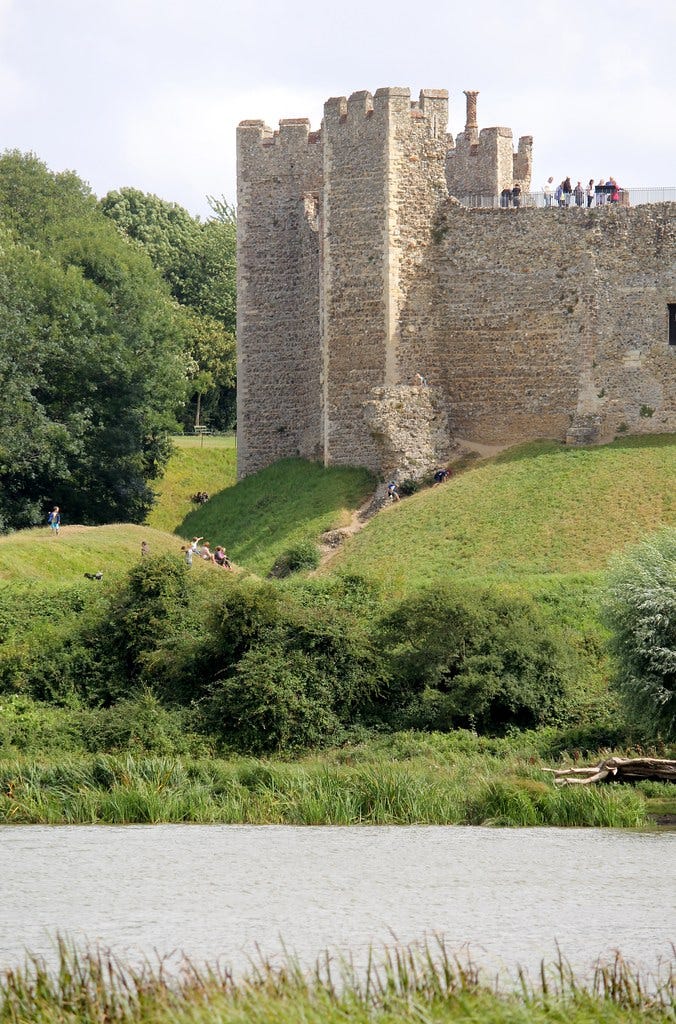'I Capture the Castle'
On Dodie Smith's quintessentially English novel as it turns 75
Welcome to A Narrative of their Own, where I discuss the work of 20th century women writers and their relevance to contemporary culture.
This week I’m looking at I Capture the Castle, the first novel by British novelist Dodie Smith, which turns 75 this year.
First published in 1948, it was written by Smith during WWII when she moved to California with her husband Alex Beesley, who was a conscientious objector. Longing for home, Smith wrote of happier times, which appears through the novel to be around the 1930s.
Smith was already a known playwright and of course, became world-famous following the success of her later children’s classic The Hundred and One Dalmations, in 1956. I Capture the Castle is said to be a young adult novel, though it is one of those rare and wonderful cross-overs.
It is an unusual book which tells the story of the Mortmains, an eccentric English family living in genteel poverty in a decaying castle. Cassandra Mortmain is the central narrator, an intelligent teenager, recounting the story through her journal pages. The story becomes a coming-of-age tale, as Cassandra moves from being a girl at the opening, to a young woman at the closing of the novel. Throughout the whole action of the story, Cassandra attempts to ‘capture’ the picture of the characters whom inhabit the castle and populate her world, in preparation for the writing of her own novels.
“I write this sitting in the kitchen sink. That is, my feet are in it; the rest of me is on the draining-board, which I have padded with our dog’s blanket and the tea-cosy. I can’t say that I am really comfortable, and there is a depressing smell of carbolic soap, but this is the only part of the kitchen where there is any daylight left. And I have found that sitting in a place where you have never sat before can be inspiring – I wrote my very best poem while sitting on the hen-house. Though even that isn’t a very good poem. I have decided my poetry is so bad that I mustn’t write any more of it.”1
Cassandra’s eccentric father is a struggling writer who has had no success since his first experimental, modernist novel, which nevertheless sold well. From the success of the novel, he took the unusual decision of taking out a forty-year lease on a dilapidated castle in Suffolk, presumably hoping that it would provide inspiration and isolation in which to write. Sadly, at the opening of the novel, the family are having to sell the furniture to buy food, due to his lack of funds and income.
The story also features his second wife, Topaz, a beautiful artist’s model, who enjoys communing with nature (often almost naked) and Rose, the elder daughter, who is a classic English beauty, pining away in the isolated castle, hoping for a rich gentleman caller to appear. As she divulges to Cassandra, she wants to be the character in a Jane Austen novel.
Cassandra, meanwhile, has literary ambitions, rather than romantic. There are also two other male characters: Stephen, the live-in son of the late maid, and Thomas, the youngest child. Stephen is in love with Cassandra, something of which she is very much aware.
The action really begins when a wealthy American family, the Cottons, inherit a nearby Hall and become the Mountmain’s landlords. This introduces Rose and Cassandra to the family’s two sons, Simon and Neil. Rose, though not attracted to the eldest son and heir, Simon, decides she will try to marry him as she wishes to escape poverty. Initially finding Rose’s overt flirtation with Simon intolerable, the families eventually become good friends, and Simon proposes to Rose after some conniving by Cassandra and Topaz.
Whilst Rose is on a visit away from the castle, however, Simon and Cassandra kiss, leaving her wracked with guilt. She decides to encourage him in his ambitions to become a model and actor, as well as joining forces with Thomas to entrap her father in a tower in order to tackle his writer’s block.
More romantic confusion takes place as Rose and Neil pretend to hate each other whilst secretly falling in love, and Simon appears to be on the brink of proposing to Cassandra, before leaving for the States. The book closes on an ambiguous, but satisfyingly amusing note, with Cassandra acknowledging that Simon has promised to return.
“Only half a page left now. Shall I fill it with ‘I love you, I love you’ … No. Even a broken heart doesn’t warrant a waste of good paper…”
then, a paragraph later:
“He said he would come back.
Only the margin left to write on now. I love you, I love you, I love you.”
Although the book appears at first glance to be a youthful romp through the teenage years and a tale of thwarted romance, it has, at its heart, deeper considerations of sex and money. In fact, Rose’s comments about wishing to live in a Jane Austen novel resonate; like the best of Austen heroines, and though Cassandra amusingly tells the tales of their misadventures, the reality of marriage for the girls as an escape from their picturesque but very real poverty is possibly the only option.
In one imaginative passage, Rose confesses to Cassandra that she would consider selling herself on the streets, only to be told that this would fail in the countryside location of Suffolk. But there is a tangible reality here: the girls are stuck in an isolated place with a father who is unable or unwilling to provide for them, and with Rose at least seeing the only means of escape available to a young woman in such a predicament as marriage to an eligible man.
Although Cassandra is ‘capturing’ the life of the people in the castle as suggested before, I do also wonder when reading whether her title and her central narrator could be using the euphemism of capture to indicate that if she becomes the successful novelist that her father appears to be incapable of, perhaps she will be in the position to save herself.
Rose’s decision to pursue the eligible Simon has further echoes of an Austen heroine, and Smith must surely have had these novels in mind when she was writing her quintessentially English story. Rose’s pursuit of Simon resembles the worst of the Bennett sisters of Pride and Prejudice, before descending into something of an English farce, with the surreal story lines involving, amongst other things, a fur coat mistaken for a bear and the cast of characters realising they are actually in love with somebody else.
Cassandra’s voice, however, is strong throughout the book, which is cleverly split into three sections: ‘The Sixpenny Book’, ‘The Shilling Book’ and ‘The Two-Guinea Book’, all of which cleverly indicate the family’s financial optimism as they meet the Cottons. Cassandra’s voice also notably develops as she leaves behind childhood and enters an adult awareness. There is also a yearning on the part of Cassandra by the end of the novel, however, for the simpler times of her youth and a longing that the real-life Smith likely felt in her self-imposed exile in California.
Although the novel has a clearly comic spirit, it also has hints of sadness, not least in Cassandra’s matter-of-fact declaration of her mother’s demise eight years previously:
“Mother died eight years ago, from perfectly natural causes. I think she must have been a shadowy person because I have only the vaguest memory of her and I have an excellent memory for most things.”
Much that is not said within this novel forms a deeper connection with the reader.
What the book is also about is the actual act or art of writing itself. Cassandra’s father is a failing writer. The patriarch is an eccentrically drawn character who, whilst being somewhat of a tyrant, also has bucket loads of charisma and a love of biscuits. He is always playing the act of a writer, even trying to convince himself that he is writing again, when in fact he is not.
Whilst on Cassandra’s part, she harbours a desire to write and her journal keeping is simply a vehicle towards becoming a novelist. Noting a particularly difficult moment for her sister Rose, she states:
“I really ought to have gone over and comforted her, but I wanted to set it all down here. I begin to see that writers are liable to become callous”.
I Capture the Castle is something of a conundrum: at first glance, a quintessentially romantic comedy, but at its heart, one which captures a young woman’s discovery of her sense of self, and that moment in time when she begins to understand how the world works, and subsequently, her place in it.
On a more general note, as a piece of English fiction between the wars, it is still an entertaining romp.
If you have just found this newsletter and love discussions on all things literature, as well as connections to both contemporary culture and the art of writing, please consider a free or paid subscription. Paid subscriptions help me to continue to write and research quality newsletters every week - and the yearly fee works out at just £2 per month! Thank you for reading 😀
Dodie Smith, I Capture the Castle, Vintage Classics.




This is a lovely book, and I remember it as very funny? There's an interesting comparison with Diana Tutton's 'Guard your Daughters' although that becomes much darker. But both share that genteel poverty middle class dilemma, of what happens to 'nice girls' for whom marriage is the only acceptable future, as they are poorly educated, pre Women's Lib, aware of sex but pre contraception...what a nightmare.
This brought back some happy memories of childhood reading! I enjoyed ‘I Capture the Castle’ when I first read it - it’s definitely got a comforting and nostalgic feel, but there are some interesting undertones too :)